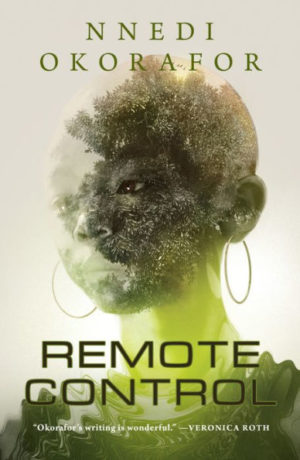This is the story of Sankofa and how she came to be—an icon, a feared pseudo-spirit, and a many-faceted metaphor. Nnedi Okorafor’s latest novella, Remote Control, is the melancholy tale of Sankofa’s search for peace and closure as she evolves into something far beyond an adolescent girl. Set in a futuristic Africa, autonomous machines, drones, and robots exist side by side with long-held cultural and spiritual beliefs—witchcraft is alive and well in the future, as it will be as long as the human imagination endures. It’s a classic coming-of-age story where a young protagonist endures personal devastation, only to adapt and grow into her own skin.
In this case, Sankofa’s skin isn’t quite her own—she’s been given a gift, of sorts, in the form of an unearthly green glow that comes with deathly powers. And while the book’s marketing promoted this as a story about “Death’s adopted daughter,” which I half-expected to include a tried-and-tested mentorship dynamic, it’s much better than that. It’s a richly rewarding look at identity and independence as Sankofa develops her own convictions, even as everything she knows and loves—her home on a shea fruit farm, her family, her identity—is taken away from her. At times bloody and grim, Okorafor’s straightforward prose highlights Sankofa’s precociousness as she tries to make sense of her frightening new abilities.
Things come to a head in the small city of RoboTown, whose citizens proudly boast of one of the few “robocops” in Ghana—in this case, a robot that controls traffic, flanked by drone “eyes.” It’s especially compelling in light of Sankofa’s death-touch when it comes to technology– she’s a walking EMP, which is understandably not something that RoboTown’s residents want around their smartphones and jelli tellis. Unlike her normal teen peers, Sankofa can’t just google things online or watch TikToks —she must cajole information out of other teenagers in person, in conversation. Perhaps the most fascinating dynamic—at least, to me—was Sankofa’s willingness to try and assimilate herself into a place that simply sees her as a means to an end. “All these devices we use are spies,” one kid tells her matter-of-factly. “That’s why you’re like a superhero; they can’t control you.”
Buy the Book


Remote Control
One of the most striking sections of the novella is where Sankofa is persuaded to embrace the idea of normalcy. Here, Okorafor illuminates a painful part of the teenage psyche—the desire to belong, even if it means going through the motions of what people consider to be “normal.” At the RoboTown mosque, she reconnects with memories of her family through prayer, speaking to our need for human rituals to reinforce social structures and community.
Okorafor adds just the right touches of adult condescension and pubescent compliance to build a familiar scenario that resonates with many a reader—memories of being young and confused and stubborn, but secretly hoping for guidance and acceptance. “Sankofa wanted to be offended… but the woman was right, Sankofa did prefer the floor, and she had spent the week in the bush once and loved it so much that she yearned to return to it,” Okorafor writes. This subtle insidiousness that so many of us are familiar with is kryptonite to Sankofa, who longs for a sense of family and routine again.
It is this ongoing tug-of-war for control that forms the heart of Okorafor’s story—adults try to control Sankofa for their own reasons, as she, in turn, tries to control her powers and her own destiny. There’s a sense of pragmatism that permeates her world—shopkeepers invite her to stay to keep thieves and thugs away, and in return, Sankofa gets fed and housed. And even as she takes part in this symbiotic ecosystem, the novella sees her breaking free from the desire to belong. Instead, she heads back to her hometown for closure, and perhaps to embrace a new purpose. And while references to “remote control” within the context of witchcraft escaped me, it conjured an elusive sense of mystery that kept the pages turning until there was nothing left to read.
Some of the most pleasant passages are where Sankofa spends time in the bush, away from prying eyes and opportunistic adults who might use or abuse her. It speaks to a long heritage of fiction that explores young personhood and its place in nature, where human concepts of control are absurd and arbitrary. Sankofa lurks on the periphery of civilization as someone who simply doesn’t fit anywhere; to drive the point home, when she stumbles across three old farmers kvetching about their granddaughters, it’s one of the few genuine moments of warmth and humanity she gets to experience, albeit from the shadows. This grows into possibly one of the most benign relationships she has in the course of her adventures–one of mutual respect that avoids the usual dance around power and control. Okorafor has a gift for weaving in these small anecdotal details that speak volumes.
In the course of Remote Control’s modest 101 pages, Okorafor smartly avoids needless worldbuilding details—instead, she drops neatly-sized crumbs that draw easy parallels between our current reality and Sankofa’s world. The presence of an omniscient, omnipotent corporation named LifeGen that harvests data, for instance, needs no further explanation. And while the novella ends a little too abruptly for my own curiosity, the alternative would have made for a much poorer story. Sankofa’s journey ends on a decidedly open-ended note, imbuing her with a sense of agency that brings her full circle—from a shea farm she came, and to a shea farm she returns.
Remote Control is a charming read, opening up a universe of possibilities for more (or perhaps, in a world where we expect things to go on forever, perhaps Remote Control is, in fact, just right as it is).
Remote Control is available from Tordotcom Publishing.
Alexis Ong is a freelance culture journalist with weak ankles who mainly writes about games, tech, and pop culture. Her work has appeared in The Verge, Polygon, Kotaku, Rock Paper Shotgun, VICE, Dazed Digital, and more; soft spots include science fiction, internet archaeology, comics, boxing, and old games. You can find her at her website or on Twitter.










